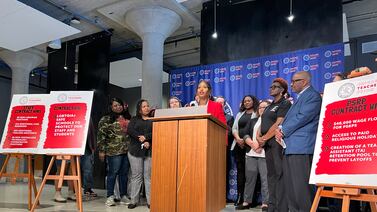Sign up for Chalkbeat Colorado’s free daily newsletter to get the latest reporting from us, plus curated news from other Colorado outlets, delivered to your inbox.
School choice will be on the Colorado ballot in November, but the intent and implications of the proposed constitutional amendment are in dispute.
Backers of a measure to enshrine in Colorado’s constitution a child’s right to school choice submitted enough signatures to earn a spot on the ballot, state officials said last week.
Conservative advocacy organization Advance Colorado proposed the measure, which was initially called Initiative 138 and is now called Amendment 80. Its leaders say the initiative would protect families’ ability to educate their children the way they see fit — whether that be in a traditional public school, charter school, private school, or home school — from attacks by state lawmakers who want to erode school choice in Colorado.
“This says, ‘Hey, as a family, we trust you to make the best education choice for your child,’” said Kristi Burton Brown, the executive vice president at Advance Colorado. “We want to make sure that right is preserved forever for all families throughout our state.”
Opponents of Amendment 80, including the statewide teachers union, say it’s a “wolf in sheep’s clothing” that would lead to vouchers that use public money to pay tuition at private schools.
“They’re using the innocuous word of ‘choice’ as a vehicle for what opens the door clearly for a voucher scheme,” said Kevin Vick, president of the Colorado Education Association. “There’s no other reason to include private schools in [the initiative] unless that is their ultimate intent.”
The text of the proposed Amendment 80 is short. It says:
- All children have the right to equal opportunity to access a quality education.
- Parents have the right to direct the education of their children.
- Each child in kindergarten through 12th grade has the right to school choice.
- School choice includes neighborhood schools, which is shorthand for traditional public schools; charter schools, which are publicly funded but independently run; open enrollment options, which refers to a student’s ability to request to enroll in any public school; private schools; home schools; and “future innovations in education.”
“One thing we’re trying to drive home to people is how simple this measure is,” Burton Brown said. “There are some [measures] that are complicated. This is not one of them.”
But where Burton Brown sees simplicity, others see ambiguity.
Does a right to school choice include a right to attend a private school, even if a family can’t afford tuition? Does equal opportunity to a quality education mean a student could sue the state if their school has less funding and resources than another school? Does a parent’s right to direct their child’s education mean they can make specific demands of the teacher?
“It really is a ‘full employment for lawyers’ act,” said Kevin Welner, a professor of education policy at the University of Colorado Boulder and director of the National Education Policy Center. “It puts judges in the driver’s seat later on to try to make some sense out of this.”
Colorado has a long history of school choice
Public school choice is already guaranteed in state law. For the past 30 years, Colorado has allowed public school students to apply to attend any school in their district or another district.
That includes traditional public schools and charter schools. Colorado was one of the first states in the country to pass a charter school law. As of last year, there were more than 260 charter schools in Colorado, according to the state education department.
Home schooling is also recognized in Colorado law as “a legitimate alternative to classroom attendance.” Similar to Amendment 80, the home school law says it is “the primary right and obligation of the parent to choose the proper education and training” of their children.
But Burton Brown said she and others worry that the rights guaranteed under Colorado law “are being attacked by people in power.”
She pointed to a Democrat-backed bill introduced in the state legislature earlier this year that would have given school districts more control over charter schools and made it easier to close charters with low enrollment. The bill would have also changed the appeals process for charter school decisions and allowed districts to keep more of charter schools’ per-pupil funding in exchange for providing special education services, among other changes.
The bill failed to pass. Several Democrats joined Republicans in voting no. Democratic Gov. Jared Polis, who founded a charter school, also opposed the bill.
The statewide teachers union supported the bill, and Vick testified in favor of it. But he disagrees that school choice is under attack or that voters must amend the constitution to protect it.
“We’ve had school choice as a major part of our education laws for the last 30 years,” Vick said. “Why would this be needed now?”
Burton Brown said that although school choice in Colorado still has bipartisan support at the state Capitol, that may not always be the case.
While private schools haven’t yet been targeted in Colorado, Burton Brown said, “our measure is protective of future attacks against them.”
Backers say this isn’t about vouchers. Others aren’t so sure.
Burton Brown said Amendment 80 is not about private school vouchers for K-12 schools, which have thus far been rejected in Colorado. But her organization, Advance Colorado, did initially propose another initiative that was explicitly about vouchers.
That proposal was similar to Amendment 80 with a few additional sentences, including: “Parents and guardians have the right to direct per pupil funding to the schooling of their choice.”
That would have been a voucher program, Burton Brown said. But she said her organization decided not to pursue gathering signatures to get that measure on the ballot this year.
“Right now, the best battle to fight in Colorado is establishing a right to school choice,” she said.
A research brief released by Advance Colorado in June noted that while Colorado does not fund private schools with public dollars, there is one exception: the state’s relatively new universal preschool program, which pays for 4-year-olds to attend both public and private preschools.
The state is currently in a lawsuit with two Catholic preschools that sued over the requirement that they sign a nondiscrimination agreement to participate in the program. The preschools argued that admitting children from LGBTQ families would conflict with their beliefs.
In a written statement attributed to Vick, the Colorado Education Association cited a concern that opening the door to private school vouchers could lead to discrimination.
“Aren’t we tired of these schemes that take from the many and give to the few?” it said.
Both Welner, the University of Colorado Boulder professor, and Parker Baxter, the director of the Center for Education Policy Analysis at the University of Colorado Denver, opined that Amendment 80 on its own would not immediately make private school vouchers legal in Colorado.
But both said it could be a step in that direction.
“I don’t think it’s clear this establishes a right to public funding of private education,” Baxter said. “This language will likely make it a topic of litigation for years to come.”
Burton Brown, a constitutional law attorney, said that’s normal for constitutional amendments. Inevitably, she said, every constitutional right ends up in court.
“Everyone understands what school choice means,” Burton Brown said. “I don’t think it’s as nebulous as our opponents like to claim.”
Note: The text and headlines of this story have been updated to refer to the ballot measure as Amendment 80, not Initiative 138. The measure was initially known as Initiative 138. Now that the ballot has been finalized, the measure will be referred to as Amendment 80.
Melanie Asmar is the bureau chief for Chalkbeat Colorado. Contact Melanie at masmar@chalkbeat.org .







